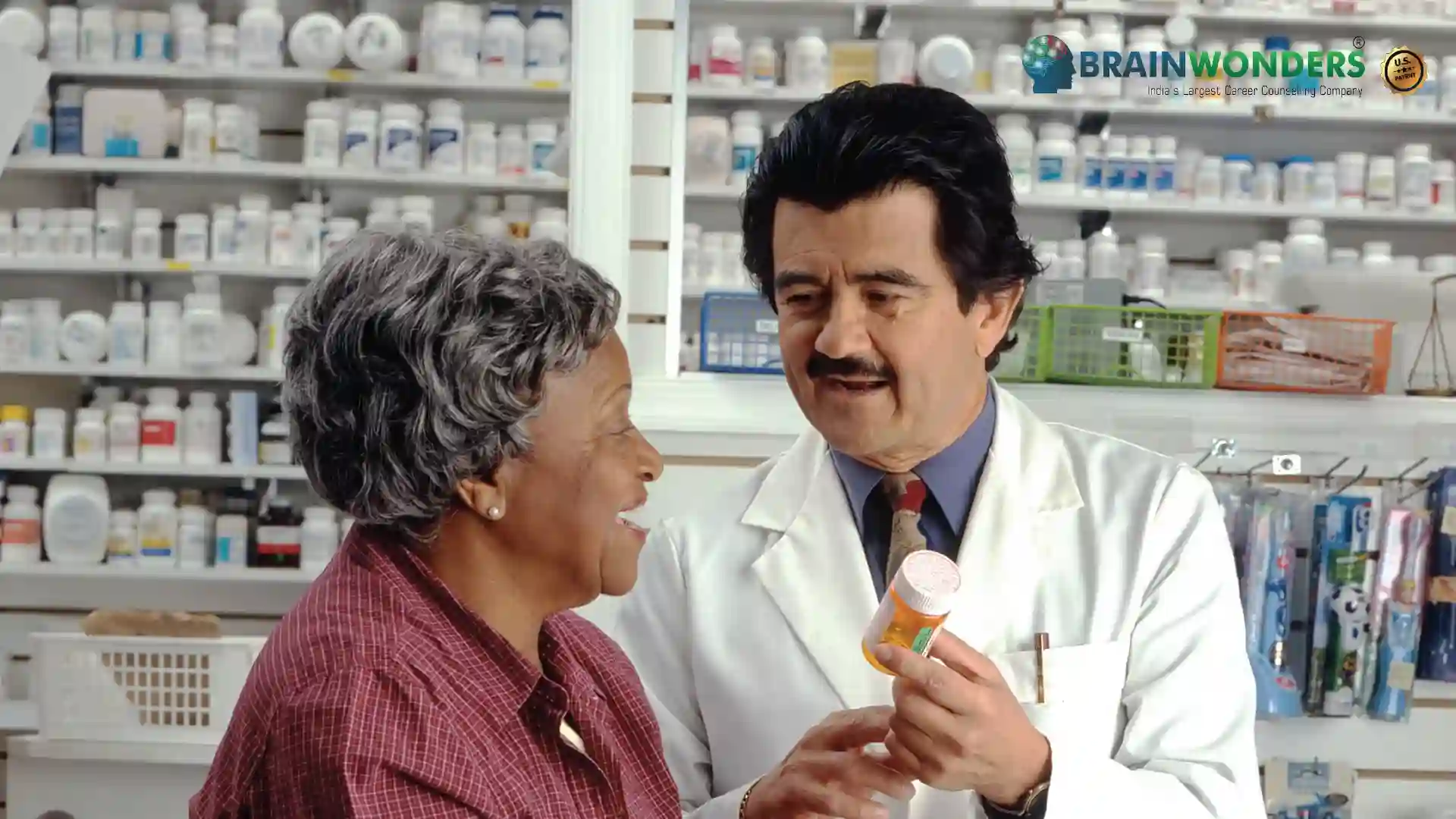How to become a Pharmacologist
Overview, Courses, Exam, Colleges, Pathways, Salary

Overview
Who is Pharmacologist ?
A pharmacologist means someone who performs experiments on animals or on human subjects seeking to produce chemical compounds and substances that can be used as new drugs. Pharmacologists are researching the effects of medicines and other constituents on plants, animals and humans. Some pharmacologists concentrate on the effects of dangerous chemicals, while others investigate the harmful and favourable effects of chemicals on particular body regions, like the respiratory or cardiovascular system.
Pharmacologists vs Pharmacists. Pharmacologists must not be misunderstood as pharmacists who distribute medications. Pharmacognosy is the branch of pharmacy which examines plants or other naturally occurring sources as a potential source of medicines.
Greater pharmaceutical dependence increased affluence that sanctions more expenditure on medication — coupled with a more extensive and ageing population - and a greater awareness of biological processes are all aspects estimated to escalate the scope for pharmacology.
Typical day at work
What does Pharmacologist do?
Job description, Profiles, Roles and Duties:
- Discover, grow and test substances intended for use in disease treatment
- Develop and conduct experiments to determine how body drug levels change over time
- Assess newly found or synthesized substances for their health, properties and potential usage as drugs
- Study what happens to a medication after it is administered
- Investigate medicinal products for unwanted or dangerous side effects and find out why they occur
- Change the chemical structure of an effective substance to eliminate unwanted side effects
- Examine other substances which have an impact on living organisms, including pollutants, poisons and insecticides
- Write medical reports and research papers, as well as more universal facts for the academic, administrative, political and common public
- Providing managers, politicians, primary producers, healthcare workers and the common public with policy and clinical assistance
- Investigates the chemical composition and role of living cells in humans, animals, plants and micro-organisms and their isolated elements, organs, and tissues
- Studies parasite and toxin forms and structures utilising systematic observation, dissection and microscopic examination
- Design, establish and execute controlled experiments
- Data collection, analysis and interpretation through complex equipment and measuring systems
- Testing medications on cells in labs, and through clinical trials on individuals
- Use the results of an examination for the development of new products and manufacturing procedures
- Oversee testing of manufactured drugs and medications, ensuring quality control and authorizing for their usage
- Carrying out research to standardize doses of medications
- Interact with national and international regulatory consultants
- Examine how drugs are broken down, consumed, and spread in the body
- Serve as an expert witness during lawsuits to testify regarding potential side-effects of a drug, how a particular medication operates or the actions of illegal drugs
Abilities and Aptitude needed
What are the skills, abilities & aptitude needed to become Pharmacologist?
Here are some essential attributes:
- Strong Scientific Foundation: A solid understanding of biology, chemistry, and biochemistry forms the basis for pharmacological research and analysis.
- Analytical Thinking: Pharmacologists must critically evaluate data, identify trends, and draw meaningful conclusions from complex scientific information.
- Attention to Detail: Precision is crucial in pharmacology, as even minor errors can impact experimental results and research outcomes.
- Problem-Solving Skills: Pharmacologists encounter various research and drug development challenges, requiring creative and effective solutions.
- Laboratory Proficiency: Laboratory techniques, equipment operation, and data collection are fundamental for conducting experiments and studies.
- Research Methodology: Familiarity with experimental design, data analysis, and statistical methods is essential for conducting valid and reliable research.
- Pharmacokinetics and Pharmacodynamics: Understanding how drugs are absorbed, distributed, metabolized, and excreted, as well as their effects on the body, is crucial.
- Medical Knowledge: Knowledge of human anatomy, physiology, and disease mechanisms helps design relevant pharmacological studies.
- Ethical Considerations: Understanding ethical guidelines in research involving human subjects and animals is essential for responsible research conduct.
- Communication Skills: Effective communication allows pharmacologists to present research findings, collaborate with colleagues, and explain complex concepts to diverse audiences.
- Critical Evaluation: Assessing published research, scientific literature, and emerging trends helps pharmacologists stay current and contribute to the field.
- Time Management: Juggling multiple experiments, projects, and deadlines requires efficient time management skills.
- Teamwork and Collaboration: Pharmacologists often work in interdisciplinary teams, requiring the ability to collaborate with scientists from different fields.
- Adaptability: The field of pharmacology is dynamic, with evolving technologies and research methodologies. Being open to learning and adapting is crucial.
- Problem Identification: Identifying potential risks, side effects, and interactions of drugs is vital for patient safety and regulatory compliance.
- Data Interpretation: It is key to draw meaningful conclusions from experimental data and translate them into actionable insights.
- Attention to Regulations: Knowledge of regulatory requirements and guidelines for drug development, testing, and approval is important.
- Computer Skills: Proficiency in using software for data analysis, modelling, and simulation enhances pharmacologists' research capabilities.
- Curiosity and Initiative: A passion for exploration, inquiry, and a proactive approach to learning drive continuous improvement and innovation.
- Clinical Perspective: Understanding the clinical implications of pharmacological research helps bridge the gap between laboratory findings and patient care.
Salary
Salary for Pharmacologist?
Salary of Pharmacologists is as follows :
- Minimum Monthly Salary: Entry-level Pharmacologists may earn a minimum monthly salary of approximately INR 25,000 to INR 40,000. These professionals typically begin their careers as research assistants, laboratory technicians, or junior scientists in academic or research institutions.
- Maximum Monthly Salary: Experienced and highly renowned Pharmacologists with advanced degrees, extensive research contributions, and expertise in specific areas of pharmacology may earn a monthly salary ranging from INR 60,000 to INR 1,20,000 or more. Compensation can vary based on factors such as research accomplishments and academic recognition.
- Annual Salary: The annual salary for entry-level or junior Pharmacologists could be around INR 3,00,000 to INR 4,80,000. Pharmacologists advance their careers, lead research projects, secure grants, and contribute to scientific advancements. Their annual income can increase from approximately INR 7,20,000 to INR 14,40,000 or higher.
- Highest Paying Jobs and Scope: Pharmacologists working in prestigious research institutions, pharmaceutical companies, and academic positions may have higher earning potential. Those who conduct groundbreaking research, publish influential studies, and collaborate on significant scientific discoveries may enjoy enhanced earning opportunities. The scope for Pharmacologists lies in studying the effects of drugs and chemicals on living organisms, advancing medical knowledge, and contributing to the development of new medications and treatments. With the pharmaceutical and healthcare industries' continuous growth and the increasing emphasis on personalized medicine and drug development, the demand for skilled Pharmacologists remains robust. Pharmacology offers a dynamic and intellectually rewarding career path with opportunities for innovation and the potential to impact healthcare globally.
Pathways
How to become an Pharmacologist?
Entrance Exam
Entrance Exam for Pharmacologist ?
Courses
Which course I can pursue?
Best Colleges
Which are the best colleges to attend to become an Pharmacologist?
Industries
Which Industries are open for Pharmacologist?
Pharmacologists are specialized professionals who study the effects of drugs and chemicals on living organisms, contributing to developing new medications, treatments, and medical knowledge. Here are some industries and sectors where Pharmacologists can find opportunities:
- Pharmaceutical Companies: Pharmacologists play a central role in pharmaceutical research and development, working on drug discovery, preclinical and clinical trials, and pharmacokinetics.
- Biotechnology Firms: Pharmacologists contribute to biotechnology research, including genetic therapies, biomarker development, and drug-target interactions.
- Academic and Research Institutions: Universities, medical schools, and research centres employ Pharmacologists to conduct research, teach, and contribute to scientific advancements.
- Government Agencies: Regulatory bodies like drug administration agencies hire Pharmacologists to evaluate drug safety, efficacy, and adherence to regulations.
- Hospitals and Healthcare: Pharmacologists work in hospital settings, collaborating with healthcare teams to optimize medication therapy, address drug interactions, and ensure patient safety.
- Pharmaceutical Research Organizations: Contract research organizations (CROs) specialize in clinical trials and pharmacological studies, providing opportunities for Pharmacologists.
- Toxicology and Environmental Agencies: Pharmacologists contribute to toxicological assessments, evaluating the effects of chemicals and substances on human health and the environment.
- Academic Publishing and Journals: Pharmacologists can become editors or reviewers for scientific journals, contributing to disseminating research findings.
- Medical Writing and Communication: Pharmacologists may work as medical writers, creating scientific content, regulatory documents, and educational materials.
- Pharmacovigilance and Drug Safety: Professionals in this field monitor and analyze the safety of medications, contributing to public health and regulatory compliance.
- Consulting and Advisory Services: Pharmacologists offer expertise to consulting firms, legal services, and healthcare advisory groups, providing insights on drug-related matters.
- Nutraceutical and Herbal Products: Pharmacologists can evaluate the safety and efficacy of natural products, supplements, and herbal remedies.
- Veterinary and Animal Health: Pharmacologists work in the development of medications for animals, contributing to veterinary medicine and animal health.
- Medical Device Companies: Pharmacologists may be involved in developing medical devices with pharmacological components, such as drug-eluting stents.
- Clinical Research Organizations: Pharmacologists collaborate on clinical trial design, data analysis, and research in CROs focused on drug development.
internship
Are there internships available for Pharmacologist?
Internships provide valuable hands-on experience for aspiring Pharmacologists to develop their skills, gain exposure to real-world research, and explore potential career paths. Here are some potential areas where Pharmacology internships might be available:
- Pharmaceutical Companies: Interning at pharmaceutical companies allows you to participate in drug discovery, preclinical and clinical research, pharmacokinetics, and regulatory affairs.
- Biotechnology Firms: Biotech companies offer internships in molecular biology, genetics, drug development, and therapeutic research.
- Academic and Research Institutions: Universities and research centres provide laboratory internships, assisting with ongoing research projects and experiments.
- Government Agencies: Regulatory bodies and health agencies may offer internships in drug safety evaluation, pharmacovigilance, and regulatory compliance.
- Hospitals and Healthcare Settings: Internships in hospitals involve medication therapy management, clinical pharmacology, and collaborative healthcare projects.
- Pharmaceutical Research Organizations: Contract research organizations (CROs) offer internships in clinical trials, pharmacokinetics, and research analysis.
- Toxicology and Environmental Agencies: Internships in toxicology involve assessing the effects of chemicals on health and the environment.
- Nutraceutical and Herbal Product Companies: Internships can focus on evaluating the safety and efficacy of natural products and supplements.
- Academic Publishing and Journals: Interning as a scientific editor or journal reviewer involves evaluating research submissions and contributing to publication processes.
- Medical Writing and Communication: Internships in medical writing allow you to create scientific content, regulatory documents, and educational materials.
- Veterinary and Animal Health: Internships in veterinary clinics or animal health organizations focus on pharmacological research for animals.
- Clinical Research Organizations: Internships involve assisting with clinical trial design, data analysis, and research coordination.
- Pharmacy Compounding and Retail Settings: Pharmacist internships provide exposure to medication preparation, compounding, and patient interactions.
- Pharmacovigilance and Drug Safety: Internships focus on monitoring and analyzing the safety of medications and adverse event reporting.
- Research Institutes and Nonprofit Organizations: Internships may be available in specialized research institutes, or nonprofits focused on specific disease areas or health issues.
Career outlook
What does the future look like for Pharmacologist?
Pharmacologist jobs are available across several industries, including the pharmaceutical industry, scientific research, governmental and private sector organizations (including research institutions), hospitals, other health services, or work in a university in teaching or research departments. Pharmacologists may also employ in research or crime labs.
Pharmacology offers a diversity of paths as a career. Clinical pharmacologists, for instance, concentrate on the influence of drugs on disease treatment. Neuro-pharmacologists focus on the brain and nervous system caused by drugs or chemicals.
Some pharmacologists focus on dental drugs and other substances, while others are specialized in veterinary medicines.




.webp)


